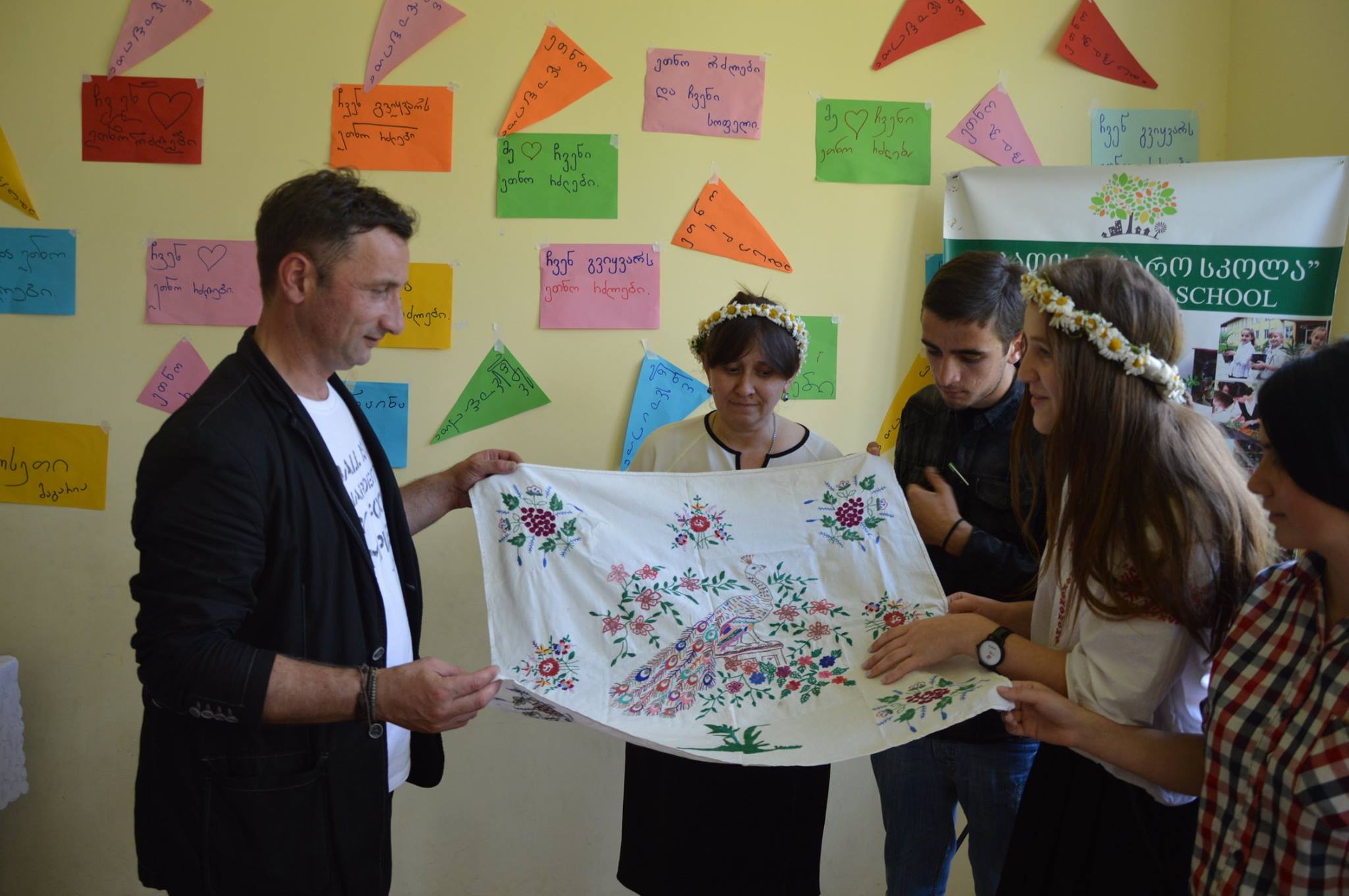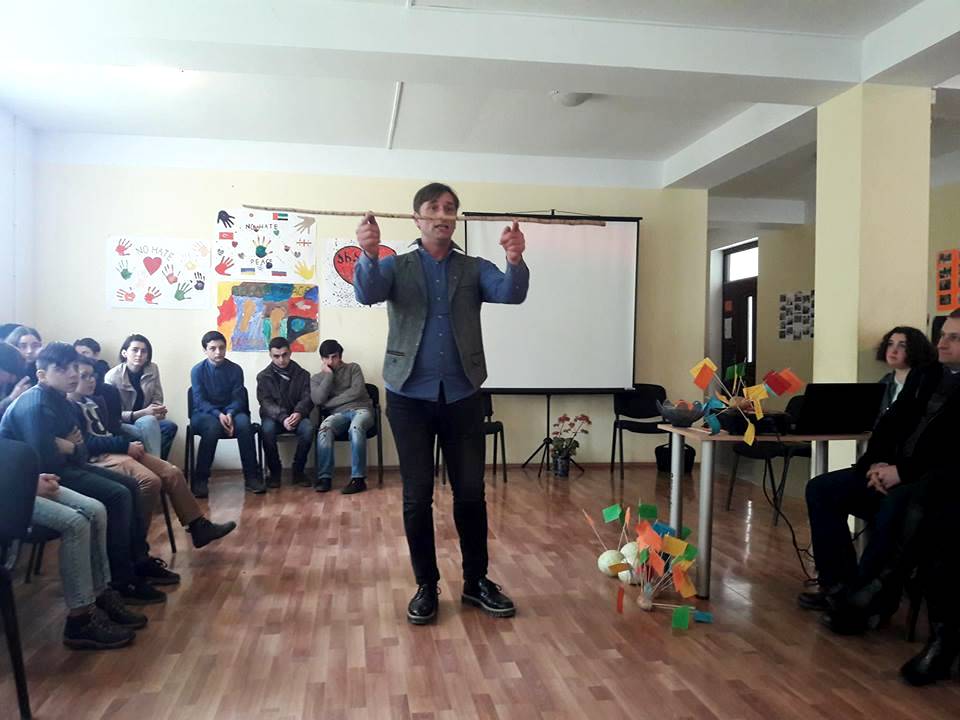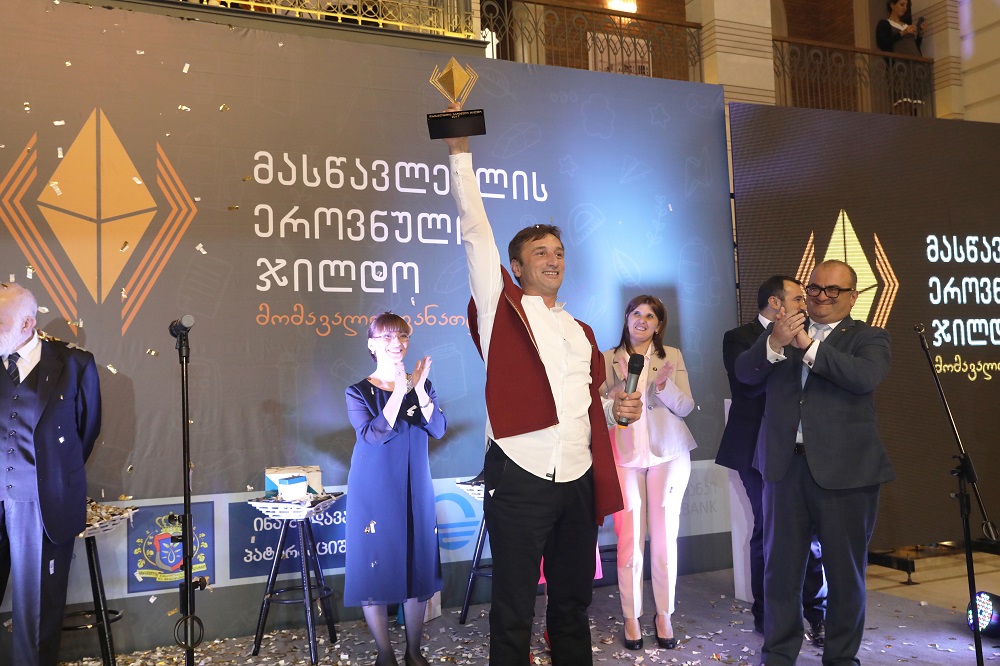Lado Apkhazava: An Ordinary Man on an Extraordinary Mission
Exclusive Interview
Vladimer (Lado) Apkhazava recently became one of the most important figures in Georgia, and in the country’s educational system in particular, by being named among the top ten finalists for the Global Teacher Prize, organized by the Varkey Foundation under the patronage of His Highness Sheikh Mohammed bin Rashid Al Maktoum, UAE Vice President and Prime Minister of the United Arab Emirates and Ruler of Dubai, which this round saw more than 5000 applicants from 127 countries nominated.
Lado, a civics teacher from the small village of Chibati, Guria, western Georgia, says he is more a philanthropist than an ordinary teacher. He is now renowned locally and abroad for applying various innovative methods to his teaching process.
The grandiose awards ceremony of the Global Teacher Prize was held on March 24, in Dubai, and had top celebrity Hugh Jackman announcing the results. Peter Tabichi, a teacher from Kenya, was named winner and recipient of an impressive prize of $1 million to put back into teaching.
Even though Lado didn’t win, he has brought incredible success to a country as small and little-known as Georgia, and, equally as importantly, he has begun to change the perspective of teaching as a profession.
GEORGIA TODAY met him to find out more about the awards and his path to success.
“Teaching is not my direct profession,” he tells us. “I stated this at my very first interview after getting the National Teachers Prize in 2017. In 1993, in the highly corrupt times of post-Soviet Georgia, I applied for university. All places were already pre-arranged for students of the teaching faculty, so I ended up doing a degree in Economics and studying at the Theological Academy, which is where I became a teacher of Religious Studies.”
After graduating, he offered classes of economics at his local school.
But before we delved further into his career development, we asked him about how his desire to teach was first borne.
“I decided to become a teacher in 8th grade,” Lado says. “I was a sensitive child and I put a lot of weight in the relationships between teachers and pupils. I could never tolerate a child being humiliated by a teacher and made notes in my pocket-book about it. I kept those notes and even today sometimes get them out to look back.”
We asked him how he had managed to succeed in his field.
“I act rather than dream,” he says. “But before taking action, I think carefully about what I want to do and measure the risks. This is what helped me to come out on top.”

He also spoke about the challenges he has faced.
“There were difficult times in Georgia when I started teaching, as the country was acclimatizing as a result of the collapse of the Soviet Union; trying to adapt to a new era. I had to overcome various obstacles. Sometimes I had no classes at all or had to deal with skepticism from the school administration and colleagues about the methods I used to teach. It took a lot to convince them of the importance of an informal education. It was a period when some might have walked away. But, by constantly exploring and sticking to my decisions, I stayed and developed. The difficulties made me much stronger.”
From self-development, Lado next focused on helping his colleagues on their own paths of development
“I decided to change my colleagues' global outlook and in this way contribute to the major shifts in the education system. Negotiations are always better and more fruitful than disputes, and it’s always more effective to showcase even the smallest results of your efforts. In Chibati, following several years of hard work, we have achieved positive outcomes and today have an established system of integrated teaching whereby the pupils are fully involved in all processes. We have also established a self-government institution, creating a small model of the state within the limits of the school. The needs of the youngsters are of paramount importance to the school administration. Being well aware of this fact, the pupils are very eager to offer new initiatives and in doing so participate in the establishment of a democratic country,” Lado says.
He also highlights the results of the teaching methods applied at the Chibati Public School.
“We have succeeded in multiple ways by applying such methods. The level of communication between adults and adolescents has increased and the pupils have learnt the vital significance of appreciating other’s views. They have also developed a number of core skills, including presentation and critical thinking. We have made major steps forwards in bringing up a new generation of active citizens with a high level of social responsibility, who will be able to face and overcome numerous obstacles, a vital skill in the modern world.”

The civics teacher also shared his experience and touched on some of the hundreds of projects he has carried out so far. One in particular caught our attention.
“I noticed the lack of tolerance between the Muslim and Christian members of our community and felt the need to act. I took my Christian pupils to the local mosque and gave a class there, focusing on the importance of respecting every individual, regardless of their faith and ethnicity, in a democratic state. After several such classes, the whole community saw that the attitude of the representatives of different ethnicities had become much warmer. I consider that to be important not only on a local level as, when my pupils travel abroad and meet new people, they will already be well-aware of the concept of equality and tolerance.”
He goes on to note that many well-established stereotypes in Georgian society can prevent teachers from making the needed and vital steps forwards towards development and success. “This is a crucial issue that urgently needs to be remedied,” he tells us.
We asked him to what extent his pupils serve as a source of inspiration for him.
“At school, we have a special box on the stairs where children can write down ideas for teachers. The location of the box also carries a symbolic message, as we consider the stairs to represent the path of our development. Children need to feel that they and their opinions are important for adults.”

We couldn’t let Lado go without asking him about his meeting Hugh Jackman.
“Hugh was very friendly and welcoming to all of us. He spent a lot of time with us at rehearsals and spoke to each finalist at the dinners. Jackman’s parents were also teachers and he himself has experience teaching, so he knows the challenges of the profession and he helped us to feel special and appreciated. But I had time to realize that only once I got home, because in Dubai we were so overwhelmed and absorbed with the exciting atmosphere that we were practically incapable of thought! There, I had a mission to present the problems seen in the Georgian educational system to the world’s leading institutions and demonstrate the country’s potential in this respect, so that was the focus of my thoughts at the time!”
Thanks to his efforts to make positive changes to the Georgian education system, Lado Apkhazava was awarded the status of Varkey Foundation Ambassador. Despite such a triumph, he is very down-to-earth about it.
“I don’t consider myself distinguished. I’m an ordinary teacher just trying to work in the very best way,” he tells us.
By Ketevan Kvaratskheliya
Image source: georgianjournal.ge










